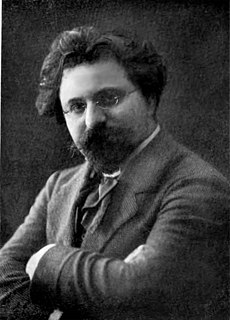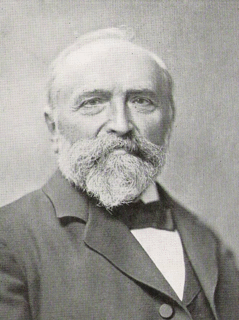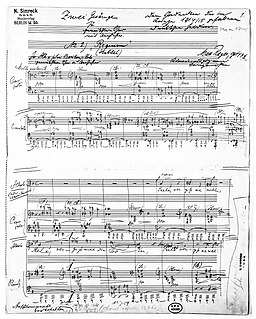Related Research Articles

Carl August Nielsen was a Danish composer, conductor and violinist, widely recognized as his country's most prominent composer.

Johann Baptist Joseph Maximilian Reger, commonly known as Max Reger, was a German composer, pianist, organist, conductor, and academic teacher. He worked as a concert pianist, as a musical director at the Leipzig University Church, as a professor at the Royal Conservatory in Leipzig, and as a music director at the court of Duke Georg II of Saxe-Meiningen.

Niels Wilhelm Gade was a Danish composer, conductor, violinist, organist and teacher. He is considered the most important Danish musician of his day.

Sigfrid Karg-Elert was a German composer in the early twentieth century, best known for his compositions for organ and harmonium.

Otto Valdemar Malling was a Danish composer, from 1900 the cathedral organist in Copenhagen and from 1889 professor, then from 1899 Director of the Royal Danish Academy of Music, Copenhagen.
Wolfgang Friedrich Rübsam is a German-American organist, pianist, composer and pedagogue.

Montgomery Rufus Karl Siegfried Straube was a German church musician, organist, and choral conductor, famous above all for championing the abundant organ music of Max Reger.

Johan Peter Emilius Hartmann was, together with his son-in-law Niels W. Gade, the leading Danish composer of the 19th century. J.P.E. Hartmann was the third generation of composers in the Danish musical Hartmann family.

Franz Xaver Neruda was a Danish cellist and composer of Moravian origin.

Knudåge Riisager was a Danish composer. His work was part of the music event in the art competition at the 1928 Summer Olympics.
August Winding was a Danish pianist, teacher and composer.

Max Reger's 1915 Requiem, Op. 144b, is a late Romantic setting of Friedrich Hebbel's poem "Requiem" for alto or baritone solo, chorus and orchestra. It is Reger's last completed work for chorus and orchestra, dedicated in the autograph as Dem Andenken der im Kriege 1914/15 gefallenen deutschen Helden.

The Reger-Chor is a German-Belgian choir. It was founded in Wiesbaden in 1985 and has been conducted by Gabriel Dessauer in Wiesbaden. Since 2001 it has grown to Regerchor-International in a collaboration with the organist Ignace Michiels of the St. Salvator's Cathedral of Bruges. The choir performs an annual concert both in Germany and Belgium of mostly sacred choral music for choir and organ. Concerts have taken place regularly in St. Bonifatius, Wiesbaden, and in the cathedral of Bruges in its series "Kathedraalconcerten". The choir performed additional concerts at other churches of the two countries and in the Concertgebouw of Bruges.

Gabriel Dessauer is a German cantor, concert organist and academic. He has been responsible for the church music at St. Bonifatius, Wiesbaden from 1981, conducting the Chor von St. Bonifatius until 2018. He is an internationally known organ recitalist and was an organ teacher on the faculty of the Hochschule für Musik Mainz. In 1985, he founded the German-English project choir Reger-Chor. He has lectured at international conferences, especially about the music of Max Reger, who was a member of the parish St. Bonifatius.

Caesar Hochstetter was an organist and a composer, arranger and critic of music from a talented Jewish family. Born 12 January 1863 in Ladenburg, a suburb of Mannheim, Germany – his date and place of death are unknown but he is thought to have disappeared during The Holocaust. Caesar Hochstetter was a friend and admirer of the well known composer Max Reger who dedicated Aquarellen Op. 25 and Five pittoresque Pieces for 4-hand Piano, Op. 34 to him.

Der 100. Psalm, Op. 106, is a composition in four movements by Max Reger in D major for mixed choir and orchestra, a late Romantic setting of Psalm 100. Reger began composing the work in 1908 for the 350th anniversary of Jena University. The occasion was celebrated that year with the premiere of Part I, conducted by Fritz Stein on 31 July. Reger completed the composition in 1909. It was published that year and premiered simultaneously on 23 February 1910 in Chemnitz, conducted by the composer, and in Breslau, conducted by Georg Dohrn.

Philipp Julius Wolfrum was a German conductor, musicologist, composer, organist and academic teacher. He was influential to university education in church music in Heidelberg, and in 1907 became the town's Generalmusikdirektor.

Zwei Choralphantasien, Op. 40, are fantasias for organ by Max Reger. He composed the fantasias in 1899 on two chorales: "Wie schön leucht't uns der Morgenstern" and "Straf mich nicht in deinem Zorn!" They were published by Musikverlag Josef Aibl in Munich in May 1900.

Zwölf Stücke, Op. 80, is a group of twelve pieces for organ by Max Reger. He composed them in Munich in 1902 and 1904. They were published by C. F. Peters in Leipzig in September 1904.
Martin Schmeding is a German church musician, concert organist and academic teacher, who has made recordings of the complete organ works by composers such as Brahms, Mendelssohn, Franz Schmidt, Max Reger and Tilo Medek.
References
- ↑ Musical opinion 1983 -Volume 107 Page 143 "The same may also be said of Niels Otto Raasted, a friend of Drischner, pupil of Reger and Karl Straube in Leipzig, who was Denmark's most gifted composer of organ music. Raasted, who was also organist of Copenhagen Cathedral, ..."